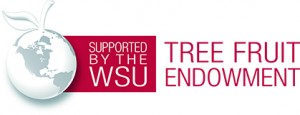News Articles
Beauty with Benefits – Native Plants for Beneficial Insects
WSU researcher David James has studied more than 100 perennial plants native to Central Washington to learn which native plants beneficial insects prefer.
Repellent Materials Bioassay for Winterform Pear Psylla
Pear psylla control is becoming increasingly difficult, especially in regions of the Pacific Northwest like the Wenatchee Valley where pear orchards dominate the landscape. In…
Reducing cold damage in apple and sweet cherry
Cellulose nanocrystals (CNC) represent a new generation of renewable nano-biomaterials with unique physical and chemical properties, and numerous potential applications. WSU Center for Precision and…
Learn why the Douglas County Voluntary Stewardship Program Helps You Avoid Additional Regulations
The Voluntary Stewardship Program (VSP) provides a non-regulatory, incentive-based method of critical area protection on lands that intersect agricultural activities. VSP is an alternative to…
FDA RELEASES DRAFT GUIDANCE DOCUMENT FOR THE PRODUCE SAFETY RULE
The FDA has released draft guidance for farms which must comply with the Produce Safety Rule (Standards for the Growing, Harvesting, Packing and Holding of…
Pesticide look-up tool for bee protection
Want to make pesticide choices that help protect the bees in your orchard? There is a web-based decision tool to help you developed by the UC…
Early Season Root Management to Reduce Calcium Deficiency Disorders in Tree Fruit
A team of Washington State University researchers, led by Bernardita Sallato, have recently initiated a 3-year project funded by WSDA on root growth management to…
Cherry Fruit School
Washington State University and Oregon State University are hosting a Sweet Cherry Fruit School: From bud to bucket on March 12-13, 2019
USDA Job Opportunity
The USDA ARS Lab in Kearneyville, WV is looking to hire a Research Plant Physiologist/Research Horticulturist. For details and to apply visit here: https://www.usajobs.gov/GetJob/ViewDetails/516609800?utm_medium=email&utm_source=govdelivery
2018 WTFRC Apple Pesticide Residue Report
Since 2011, the WTFRC has conducted studies in apple and cherry to generate pesticide residue data for commonly used insecticides and fungicides to help Washington…
